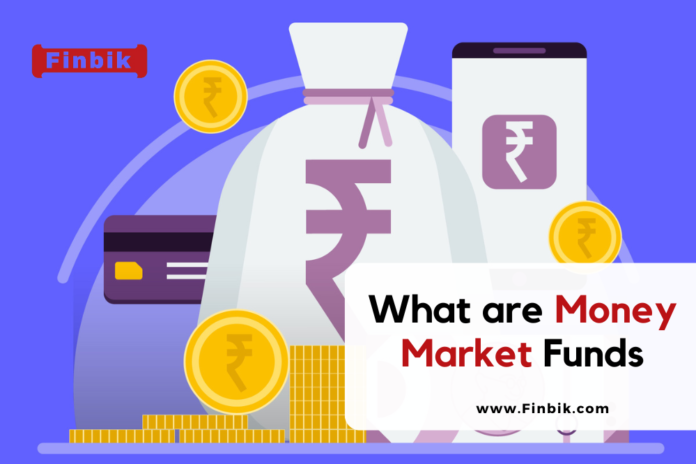You want to invest your emergency money for a short time. You want to invest where you will get low risk and higher returns. FDs and saving accounts are good options. But then you will have to deal with the least deposit or balance requirements. And in FDs, you have to pay a penalty fee to take out money before the maturity period. If you want to avoid all these things then money market funds are ideal for you. They are debt funds. They are high-quality, short-term debt funds.
Advantages of money market fund:
- Treasury bills (T-Bills)
- Certificates of deposit (CD)
- Commercial paper (CP)
- Repurchase agreements (Repo)
- Asset-Backed Commercial Paper (ABCP)
Things you should consider before investing in the money market funds

what are money market funds
What are money market funds?
The money market is a financial market. Here stock exchanges trade short-term financial assets. Money Market Funds are debt funds. They have a maturity period of up to 1 year. These funds are liquid. AAA-rated money market funds are the best. They keep a consistent Net Asset Value (NAV). They are the least volatile types of mutual fund investments.
Advantages of money market fund:
- Money Market Funds are a better option for the short term.
- Fewer chances of loss if you invest for more than 6 months.
- They give better returns than fixed deposits for the same period.
- Their maturity period is up to 6-12 months.
- Thus there is low risk on the interest rate and credit.
- It has high liquidity.
- They are safe investments with minimal to low risk.
How does it work?
Money market fund collects money from many investors. They invest it in money market securities according to the Investment Policy of the Fund. They keep the assets on behalf of the Investors. MMF gives returns to investors. or they reinvest it in the funds.
Who should invest in?
Usually, banks, large institutional investors, and individual investors invest in this market. Money market funds give more return than FDs and savings accounts for the same period. Thus it can be a great alternative for Investors. Investors who have a low-risk appetite can invest in money market funds. Those who aim to preserve capital and maintain daily liquidity. Investors who want to maximize current income. MMF is ideal for those types of investors.
Types of money market funds
There are many types of money market funds. Following are some of them:
1. Treasury bills (T-Bills)
T-bills are one of the most popular and safe money market instruments. They have maturities of up to 365 days. The Government of India issues T-bills to raise money in the short term. The returns are lower than compared to other instruments. The government sells them at discount and repay on their maturity.
2. Certificates of deposit (CD)
Commercial banks issue certificates of deposits. They are the same as fixed deposits. But unlike FDs, you can not withdraw CDs before their maturity. Their maturity period is between 3 months to 1 year.
3. Commercial paper (CP)
Commercial paper or CP is an unsecured money market asset. Large banks or corporations that have a high credit rating issue CP. CP is an unsecured promissory note. Companies use CPs to diversify their portfolio. CPs have a maturity period from 2 to 270 days.
4. Repurchase agreements (Repo)
A repurchase agreement or repo is an agreement between a dealer and an investor. The dealer sells government securities to investors. and buys them back at a little higher price. The price difference is the implicit interest rate. Investors use it to raise short-term capital. The duration of a repossession ranges from 24 hours to 48 hours.
5. Asset-Backed Commercial Paper (ABCP)
Asset-Backed Commercial Paper is like traditional commercial paper. But CP is promissory notes with no security. But ABCP has securities. The underlying securities determine the quality of the ABCP. Special purpose vehicle (“SPV”) issues ABCP. Investors use it to buy liquid or assets. ABCP holders get asset cash flows, credit enhancement, and backup liquidity. They offer funding diversity.
Things you should consider before investing in the money market funds
1. risks and returns
Money market funds carry many risks such as credit risk. The price of the asset increases as interest rates decrease. Thus such assets have interest rate risk. The fund manager may invest in securities with more risk for more return. It may offer more returns. But they do not guarantee confirmed returns.
2. Investment Period
Many debt funds have a maturity period ranging from 90 days a year. For medium-term horizons, invest in debt funds like dynamic bond funds. They help investors in storing excess cash while maintaining liquidity. There are many options. Invest according to your plan.
3. Tax
The interest on debt funds is taxable. The period for which you invest in the fund. determines the tax rate. If you invest for less than three years, you will get a Short-term Capital Gain (STCG). And if you invest for more than three years, you will get Long-Term Capital Gains (LTCG). Currently, LTCG has a tax rate of 20%.
4. Expense ratio
The expense ratio is the fee of fund houses to manage your investment. Returns on debt funds are not that high. Thus, the expense ratio is an important factor in determining MMF earnings. The expense ratio should be below to gain more profit.
In this article, we discussed about money market funds. Investing in money market funds diversifies your portfolio. They are highly liquid and generate higher returns. It generate stable and regular income. But they also carry a few risks. Thus, investors must choose money market funds properly. Invest in those assets that have good performance. They should provide steady returns over time.
Articles You May Like
How to Invest and Make Money Daily
How to Earn Money Online for Students without Investment
How to Start a Business with No Money

